Key takeaways:
- Prenatal vitamins are essential for maternal and fetal health, containing vital nutrients like folic acid, iron, and DHA that help prevent birth defects and support development.
- There are various types of prenatal vitamins, including standard, fermented, and specialized options to cater to different dietary needs and improve absorption.
- Taking prenatal vitamins can enhance energy levels, improve overall well-being, and positively impact skin health during pregnancy.
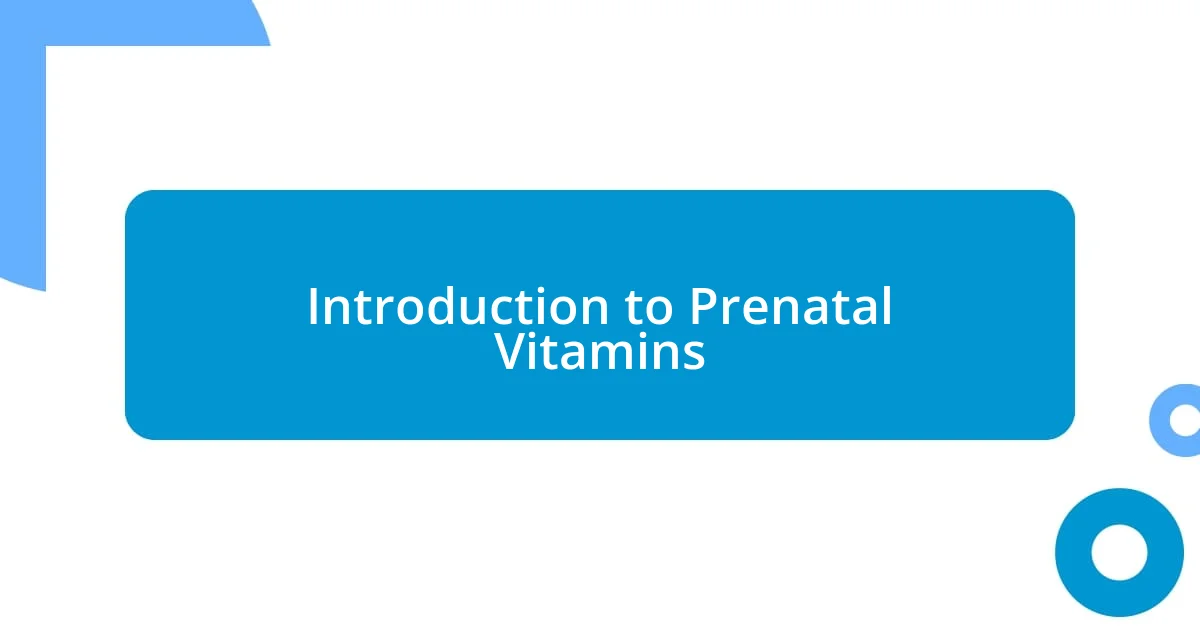
Introduction to Prenatal Vitamins
Prenatal vitamins are designed specifically to support the health of both the mother and the developing baby during pregnancy. I remember when I first learned about them; I was in a whirlwind of excitement and anxiety, wondering if I was doing enough to nourish my little one. Why were these vitamins so crucial in the early stages?
It’s interesting to note that prenatal vitamins typically contain higher levels of certain nutrients, like folic acid, iron, and calcium, compared to standard multivitamins. I once spoke with a friend who was hesitant at first, thinking, “Aren’t I already eating healthy?” But she soon discovered that these nutrients play a vital role in preventing birth defects and supporting the baby’s growth. That realization shifted her perspective completely.
One of the most surprising aspects for me was understanding how these vitamins can impact mood and energy levels during pregnancy. There were days when I felt utterly drained, and taking my prenatal vitamin reminded me that I was taking positive steps for both myself and my baby. Have you ever wondered how something so small could contribute to such significant changes in your body and mind? That’s the beautiful magic of prenatal vitamins—they’re more than just supplements; they’re a lifeline during a transformative journey.
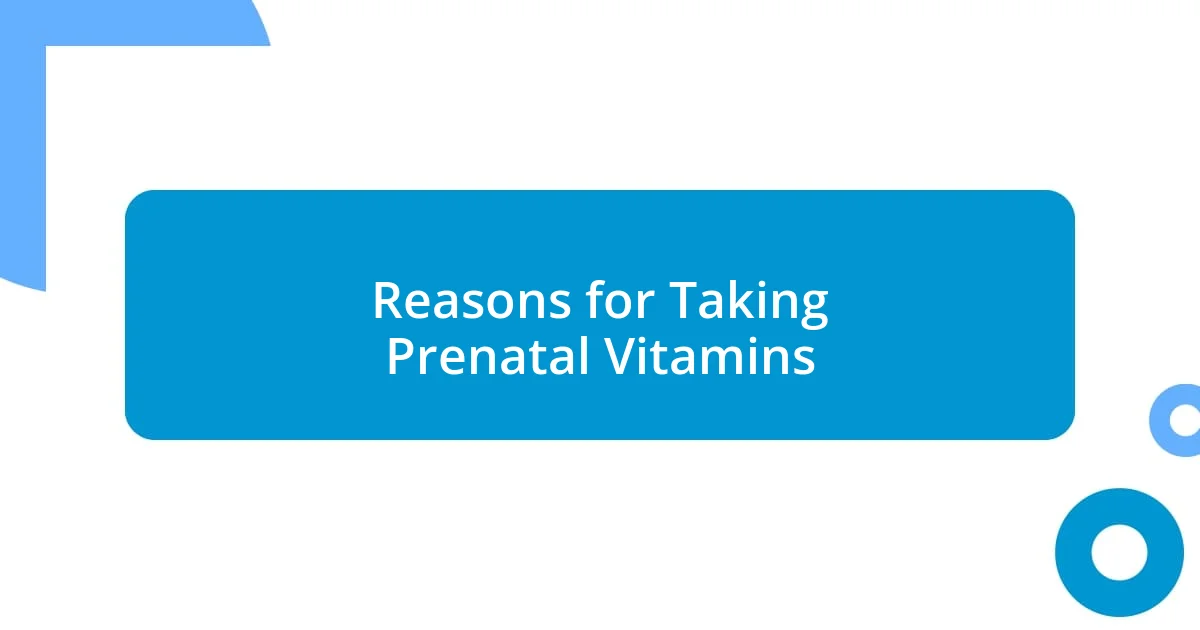
Reasons for Taking Prenatal Vitamins
Taking prenatal vitamins can feel like a small yet impactful decision, and that’s something I truly appreciated during my pregnancy. One of the main reasons for taking them is the boost in folic acid, which is essential for helping prevent neural tube defects in the baby. I remember how my doctor emphasized the importance of starting folic acid even before conception—a fact that made me realize how proactive I needed to be.
Here are some critical reasons for considering prenatal vitamins:
- Folic Acid: Reduces risks of serious birth defects.
- Iron: Supports increased blood volume and prevents anemia.
- Calcium: Essential for the baby’s bone development.
- DHA: Supports brain and eye development.
- Vitamin D: Aids in calcium absorption, crucial for bone health.
Another reason that struck me was the emotional and physical support these vitamins provided throughout my journey. On particularly exhausting days, knowing I was giving my body the right nutrients provided a sense of comfort. Taking that little pill became a ritual that helped ground me amidst the whirlwind of pregnancy. It’s reassuring to think that each vitamin I consumed was contributing to the growth and health of my child, all while helping me navigate the ups and downs of this beautiful experience.
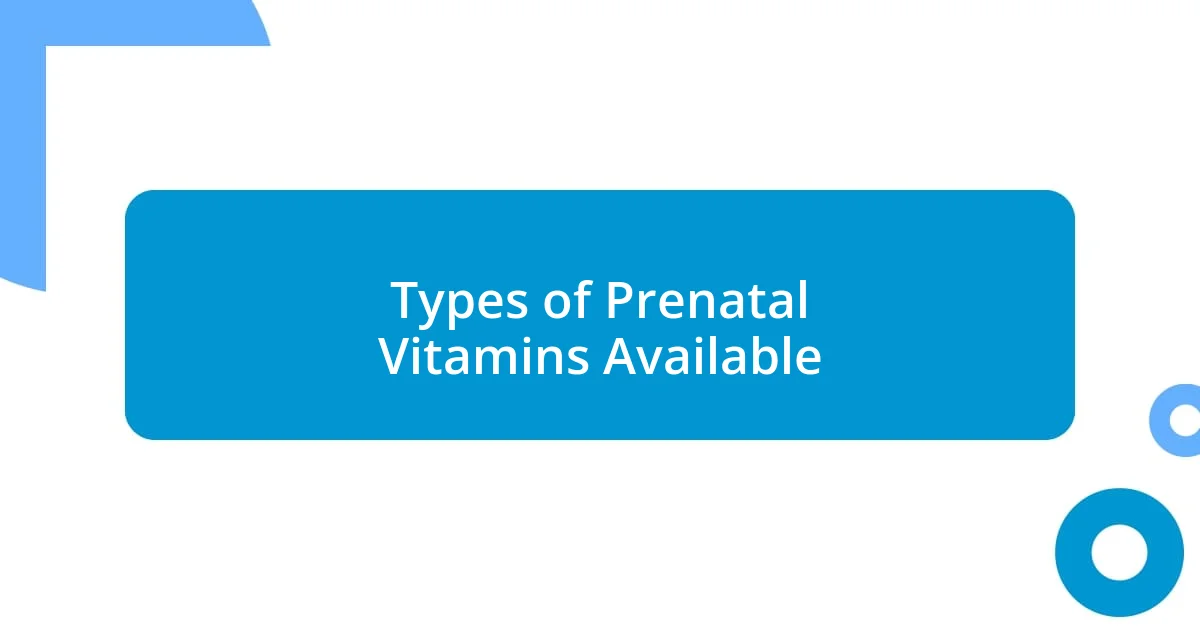
Types of Prenatal Vitamins Available
When I started my journey with prenatal vitamins, I quickly learned that there are several types available, tailored to different needs. The most common are standard prenatal vitamins, which typically include folic acid, iron, and calcium, ensuring foundational support for a developing fetus. I remember the first time I looked at the label on my bottle; it felt empowering to know that I was actively contributing to my baby’s growth.
The next type that caught my attention were the fermented prenatal vitamins, designed for better absorption. I was drawn to these because I sometimes felt queasy with conventional vitamins. They’ve become an essential part of my routine, and I recall feeling more energized after switching. It’s fascinating how these tiny changes can make such a difference during pregnancy.
Lastly, there are specialized prenatal vitamins that cater to specific dietary needs, such as vegan or gluten-free options. I have friends who follow strict dietary restrictions, and it’s heartening to see how these vitamins ensure everyone can access essential nutrients. In my experience, knowing there are various formulations made it easier to recommend prenatal vitamins to friends, as it allowed me to share what worked for me while respecting their unique needs.
| Type of Prenatal Vitamin | Key Features |
|---|---|
| Standard Prenatal Vitamins | Includes folic acid, iron, and calcium; supports overall pregnancy health. |
| Fermented Prenatal Vitamins | Enhanced absorption; often easier on the stomach; may reduce nausea. |
| Specialized Prenatal Vitamins | Tailored for dietary restrictions (e.g., vegan, gluten-free); ensures nutrient access. |
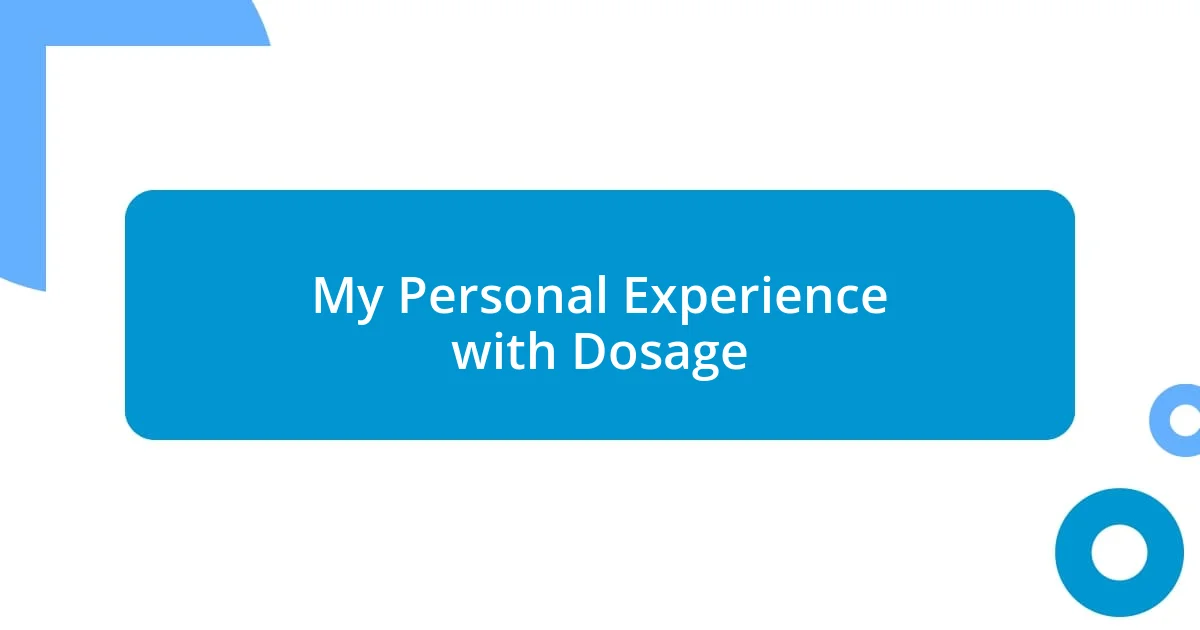
My Personal Experience with Dosage
I’ve always been a stickler for following directions, especially when it comes to health. When I started taking prenatal vitamins, I was surprised to find so many recommendations regarding the dosage. I remember doubling checking the label because I wanted to ensure I was hitting the right amounts—not too little, but certainly not too much. It felt almost like a balancing act, and I often wondered, “Am I really getting what I need?”
After some trial and error, I found that sticking to my doctor’s guidance was the way to go. I was initially hesitant to adjust my intake based on how I felt, but I realized that listening to my body was crucial. On days when I felt more fatigued, I could intuitively sense that I might need a bit more iron, so I started incorporating iron-rich foods into my diet alongside my vitamins. This holistic approach not only made me feel more in control but also cultivated a deeper understanding of my body’s needs.
Of course, there were moments of concern. I once skipped a dose during a particularly hectic day and felt a wave of guilt wash over me. Would it affect my baby? Thankfully, I learned that consistency is key, but that occasional slip-up wouldn’t derail my efforts. It’s all about creating a routine that feels achievable—after all, pregnancy is a marathon, not a sprint. And as I navigated through my journey, I discovered that finding the right dosage was just one part of a much larger, beautiful experience.
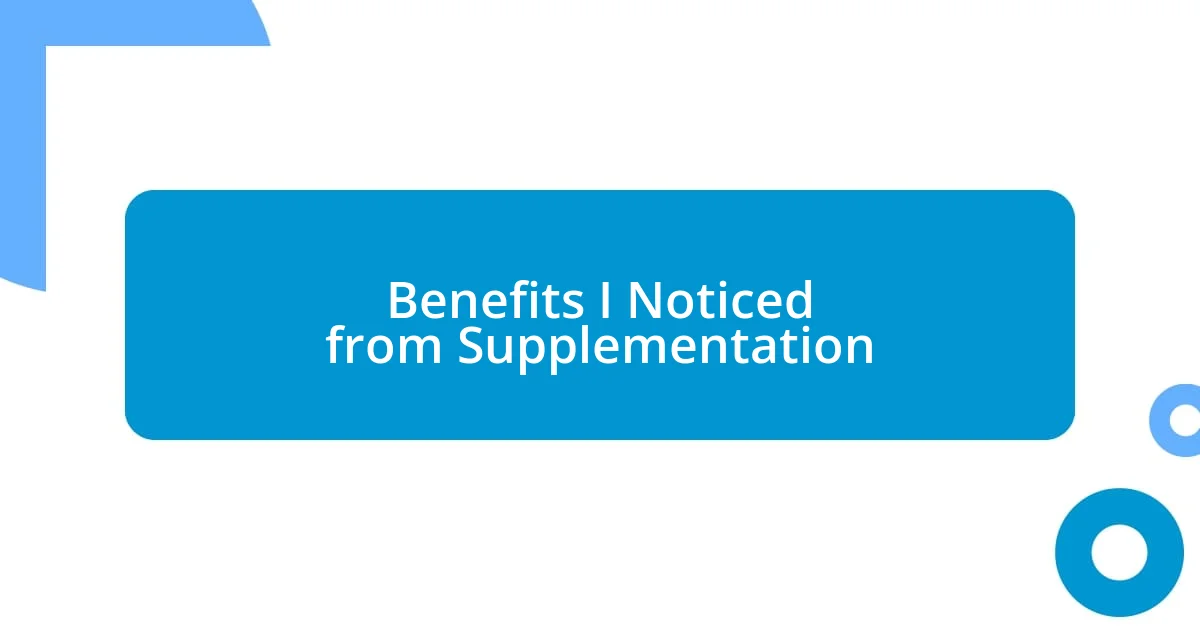
Benefits I Noticed from Supplementation
I began to notice some significant benefits from taking prenatal vitamins almost immediately. One of the first things I observed was a boost in my energy levels. In those early weeks, I was battling fatigue like many expectant mothers do, and I wondered, “Could vitamins really help?” To my delight, I found myself more alert and somewhat revitalized, which made navigating the demands of daily life feel much more manageable.
Another noteworthy change took place in my overall sense of well-being. I recall a day when I felt particularly anxious about the health of my baby. After sticking to my prenatal routine, I found comfort in knowing I was giving my body what it needed. It was like a weight lifted off my shoulders; suddenly, I felt more focused on nurturing myself and my baby rather than being consumed by worries. It’s incredible how something as simple as vitamins can shift your mindset during such a transformative time.
Lastly, I can’t neglect to mention the positive impact on my skin. I was surprised when friends started complimenting my glow during pregnancy. Initially, I thought it was merely the excitement of impending motherhood, but a part of me couldn’t help but think, “Could these vitamins actually be working wonders for my complexion?” It turns out they were! I felt more confident in my appearance, which is a nice bonus when you’re navigating the physical changes of pregnancy.













